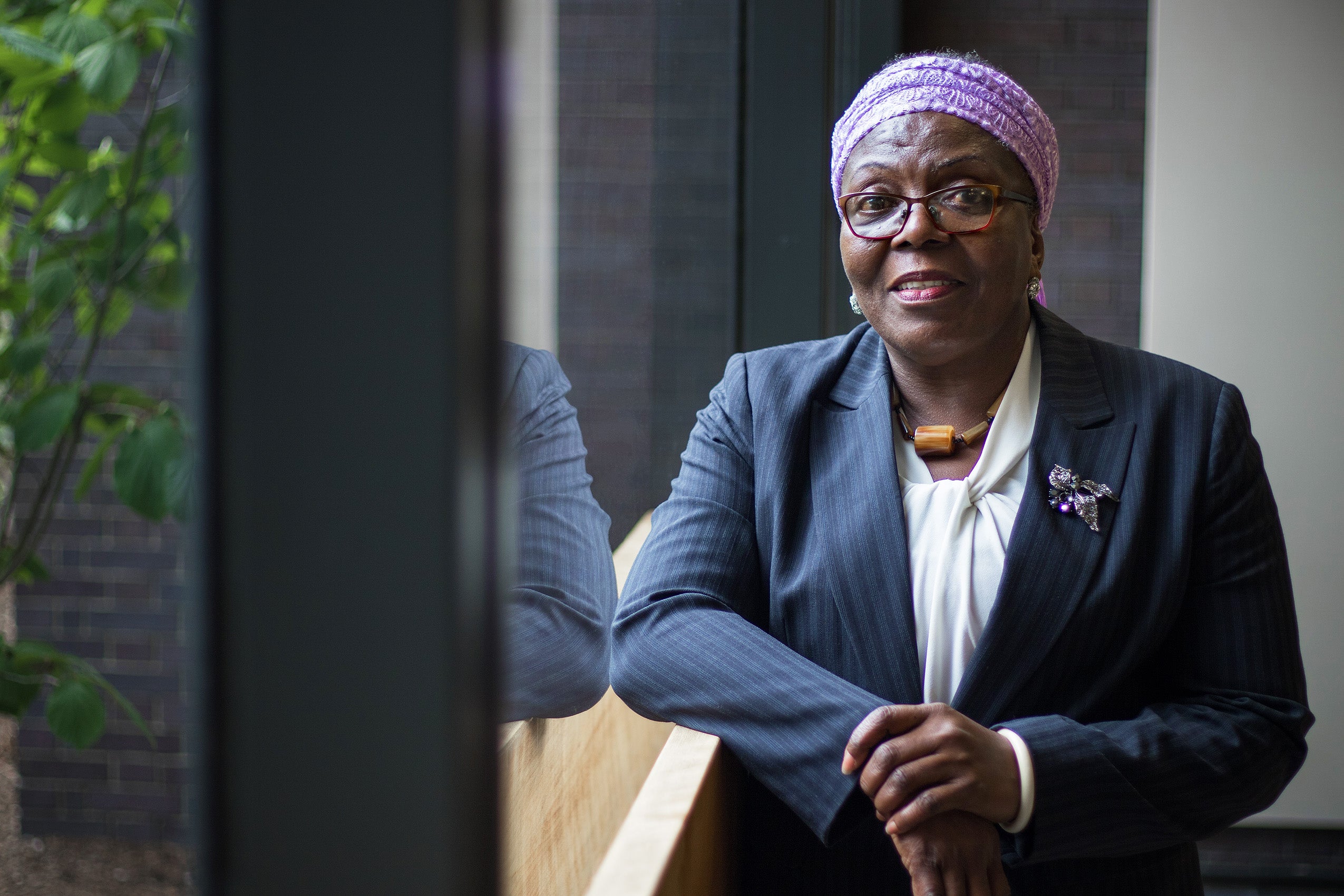This is the fifth in a series of profiles of students from the Harvard Law School Class of 2017.
Gloria Scott LL.M. ’17, who is from Liberia, served as chief justice of her country’s Supreme Court from 1997 to 2003. She has also been a practicing lawyer, a senator, and most recently, the chair of Liberia’s Constitutional Review Committee. But for the past year she has been eager to be a student again. “If you come here thinking you know,” she insists, “then you won’t learn.”
The importance of a good education—and the conviction that an educated woman can accomplish anything she wants to—is something that was instilled in her from childhood, by a family who made sure she went to the best schools that Liberia had to offer. But it was looking at the lives led by her mother and grandmother, and the inequalities they faced, that led her to study economics and law, to join student government, and to begin to participate in the political process.
Early in her career, Scott encouraged other women lawyers to join her in forming the Association of Female Lawyers of Liberia; the organization still exists, providing legal aid to indigent women. Later, she convinced the few women serving with her in the legislature to form a caucus that would serve as a platform for women’s issues. As a senator, she put a bill on the floor, unsuccessfully, to protect the growing number of women cohabitating with men. “Under the law, their children are illegitimate, so they can’t inherit,” she says. And if the man leaves and marries someone else, he can take everything. “She doesn’t get anything that she worked for, and she and the children are just abandoned,” Scott notes. Her effort was met with an enormous backlash, with religious leaders and other opponents insisting that she was undermining Islam, Christianity, and the institution of marriage. Still, there has been progress: Scott notes the recent passage of new inheritance laws that will grant the same protections to women married under tribal traditions as are granted in marriages performed under civil law.
Her country has also endured decades of unrest, and Scott’s tenure as chief justice coincided with the end of Liberia’s second civil war. “The government had fallen to pieces; the whole country came to a standstill,” she remembers. Asked to recall a significant ruling, she cites the opinion that she wrote determining that negotiators at peace talks to end the conflict did not have the authority to include extraconstitutional provisions that would take away the powers of the courts. “We felt that if we could not use the constitution as a tool, a framework to solve our problems, there was no need to have a constitution,” she observes. “Politically, I understand that a problem had to be solved. But for the sake of the country and for posterity, we needed to document that this was not correct.”
Looking forward, Scott is realistic, but optimistic: The challenges will persist, but she also sees opportunities. “I know that Liberia has a lot of problems. The situation with our lands, and the inequality, has existed for 200 years. How do we solve it? We need some deep thinking.” Her recent work with the Constitutional Review Committee included conversations with Liberians from all walks of life; hearing their thoughts and seeing how they live has convinced her that “if we don’t have some creativity in solving problems, we’ll slip back into war.”
“So that’s why I came—to know what is happening in the world, what makes the U.S. the way it is, or Europe? What is the philosophy, the guiding principles? I guess I wanted the rigor of taking my mind to another level.” Her research and writing here, and her classes, including Poverty, Civil Rights and Development, Systemic Justice, Environmental Law, and a reading group on Poverty and Democracy, have inspired her. “Coming here, reading the law, going back into history, I saw that there was a system in place that bred inequality,” she noted. “I’ve learned a lot. The different ways that you can use the law to alleviate poverty, the different models … I’m taking that back with me.”
Soon after graduation, she plans to return to Liberia and work with law schools, encouraging them to add environmental law to their curricula and to explore how environmental protections could benefit Liberia and its region. And she remains passionate about empowering women, and certain about what’s needed to bring that about: “We need to know that we can’t give up authority and power easily; we need to really work for it. It’s got to be a sisterhood. We need to reinforce each other, and form a support structure, globally.”
